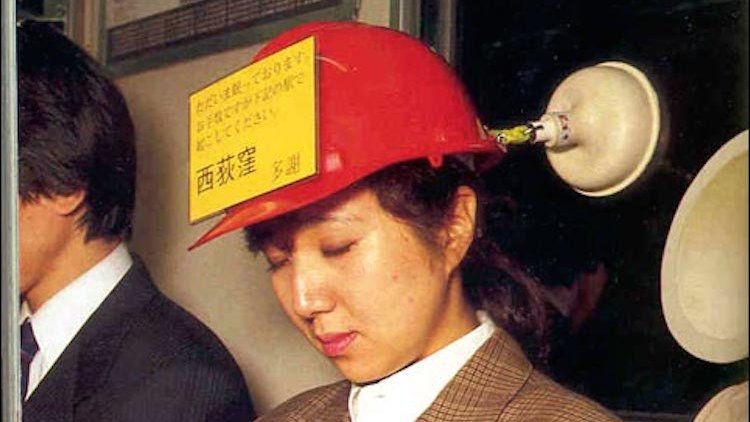I s your product useful? Or is it merely, "unuseless"? It's a subtle distinction, but a short time browsing any app store, will reveal it's a distinction many an inventor may want to get better at making.
To aid in the process, I wanted to take a look at the 10 Tenets of Chindogu, the art of absurd invention, as laid out by Japanese amateur inventor Kenji Kawakami, and see what we could learn. In one sense, it's just a fun exercise, but in another, a potentially revelatory act for any aspiring inventor.
"Literally translated, Chindogu means unusual tool. They are everyday gadgets that are ideal for solving very specific problems," according to a brilliant report on Japanese culture site Tofugu, from way back in 2012. "However, Chindogu have no utility at all. They would either cause new problems, be embarrassing to use, or just plain not be practical. They are often described as "unuseless" as they really do solve a problem but there's something else that prevents them from being put into practical use."
Sound familiar?
The report lays out the Kawakami tenets I quoted in below italicized text. For me personally, the most interesting thing about the exercise of comparing an idea to Chindogu, is that sometimes an inventor would seemingly want to aspire to the apparent absurdity, while others, run away from it entirely.
1. Chindogu Cannot Be For Real Use
It is fundamental to the spirit of Chindogu that inventions claiming Chindogu status must be, from a practical point of view, (almost) completely useless. If you invent something which turns out to be so handy that you use it all the time, then you have failed to make a Chindogu.
Lesson: Many apps today strike me as "(almost) completely useless." In order to keep from being Chindogu your app should be actually useful (frequently).
2. Chindogu Must Exist
You are not allowed to use a Chindogu, but it must be made. You have to be able to hold it in your hand and think "I can actually imagine someone using this. Almost." In order to be useless, it must first be.
Lesson: Just because you built an app, and someone downloaded it, doesn't mean they are going to use it. Is someone actually going to use your product, or did you just build Chindogu?
3. Inherent In Every Chindogu Is The Spirit Of Anarchy
Chindogu are man-made objects that have broken free from the chains of usefulness. They represent freedom of thought and action: the freedom to challenge the suffocating historical dominance of conservative utility; the freedom to be (almost) useless.
Lesson: Not everything that is cutting edge is also useful. Just because you pushed the limits of your industry, doesn't mean you've improved anyone's life.
4. Chindogu Are Tools For Everyday Life
Chindogu are a form of nonverbal communication understandable to everyone, everywhere. Specialized or technical inventions, like a three-handled sprocket loosener for drainpipes centered between two under-the sink cabinet doors (the uselessness of which will only be appreciated by plumbers), do not count.
Lesson: Is your app useful everyday? If so, good for you, but it may still be Chindogu. It's time to do a gut check. Is your product actually useful, or just unuseless?
5. Chindogu Are Not For Sale
Chindogu are not tradable commodities. If you accept money for one you surrender your purity. They must not even be sold as a joke.
Lesson: Have you ever told anyone you love what you do so much, you'd do it for free? Well, it's a beautiful concept, but you may be building a Chindogu. "You are what you charge for," as Pine & Gilmore wrote it in their 1998 classic business book, The Experience Economy.
6. Humor Must Not Be The Sole Reason For Creating A Chindogu
The creation of Chindogu is fundamentally a problem-solving activity. Humor is simply the by-product of finding an elaborate or unconventional solution to a problem that may not have been that pressing to begin with.
Lesson: Is your product dead serious, and solves a problem? Great! But you may still be building a Chindogu. What I think is most interesting about this tenet is the word, "elaborate." Chindogus tend to solve problems using way more parts than is necessary. Do you have a simple solution? There's a lesser chance what you've invented is a Chindogu.
7. Chindogu Is Not Propaganda
Chindogu are innocent. They are made to be used, even though they cannot be used. They should not be created as a perverse or ironic comment on the sorry state of mankind.
Lesson: Does your product have al ulterior motive in addition to its obvious function? If so, it certainly isn't Chindogu. One way to decrease the likelihood that your product is Chindogu is to build in multiple uses.
8. Chindogu Are Never Taboo
The international Chindogu society has established certain standards of social decency. Cheap sexual innuendo, humor of a vulgar nature, and sick or cruel jokes that debase the sanctity of living things are not allowed.
Lesson: Is your product rated PG-13 or higher? You certainly didn't build a Chindogu.
9. Chindogu Cannot Be Patented
Chindogu are offerings to the rest of the world, they are not therefore ideas to be copyrighted, patented, collected, and owned. They must be freely available for use by everyone.
Lesson: Is your idea opensource? Do you believe your idea is so powerful that no single person should own it? Well, you may have built a Chindogu.
10. Chindogu Are Without Prejudice
Chindogu must never favor one race or religion over another. Young and old, male and female, rich and poor, all should have a free and equal chance to enjoy each and every Chindogu.
Lesson: Is your product universally applicable? Can everyone in the world use it, regardless of social status, gender, race, or age? Beautiful. You may have build a Chindogu.
